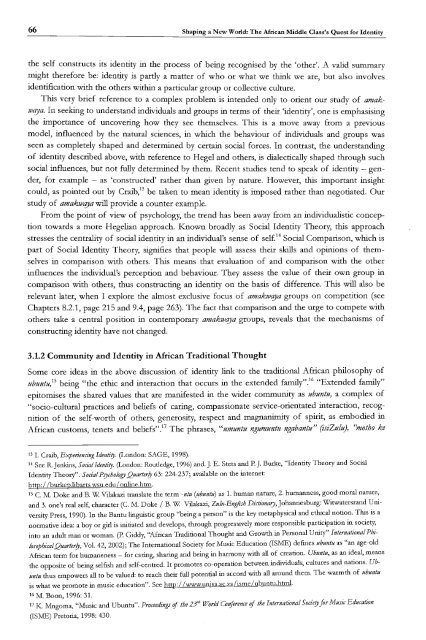South African Choral Music (Amakwaya): Song, Contest and the ...
South African Choral Music (Amakwaya): Song, Contest and the ...
South African Choral Music (Amakwaya): Song, Contest and the ...
Create successful ePaper yourself
Turn your PDF publications into a flip-book with our unique Google optimized e-Paper software.
66 Shaping a New World: The <strong>African</strong> Middle Class's Quest for Identity<br />
<strong>the</strong> self constructs its identity in <strong>the</strong> process of being recognised by <strong>the</strong> 'o<strong>the</strong>r'. A valid summary<br />
might <strong>the</strong>refore be: identity is pardy a matter of who or what we think we are, but also involves<br />
identification with <strong>the</strong> o<strong>the</strong>rs within a particular group or collective culture.<br />
This very brief reference to a complex problem is intended only to orient our study of amak<br />
wqya. In seeking to underst<strong>and</strong> individuals <strong>and</strong> groups in terms of <strong>the</strong>ir 'identity', one is emphasising<br />
<strong>the</strong> importance of uncovering how <strong>the</strong>y see <strong>the</strong>mselves. This is a move away from a previous<br />
model, influenced by <strong>the</strong> natural sciences, in which <strong>the</strong> behaviour of individuals <strong>and</strong> groups was<br />
seen as completely shaped <strong>and</strong> determined by certain social forces. In contrast, <strong>the</strong> underst<strong>and</strong>ing<br />
of identity described above, with reference to Hegel <strong>and</strong> o<strong>the</strong>rs, is dialectically shaped through such<br />
social influences, but not fully determined by <strong>the</strong>m. Recent studies tend to speak of identity - gender,<br />
for example - as 'constructed' ra<strong>the</strong>r than given by nature. However, this important insight<br />
could, as pointed out by Craib,13 be taken to mean identity is imposed ra<strong>the</strong>r than negotiated. Our<br />
study of amakwqya will provide a counter example.<br />
From <strong>the</strong> point of view of psychology, <strong>the</strong> trend has been away from an individualistic conception<br />
towards a more Hegelian approach. Known broadly as Social Identity Theory, this approach<br />
stresses <strong>the</strong> centrality of social identity in an individual's sense of self. 14 Social Comparison, which is<br />
part of Social Identity Theory, signifies that people will assess <strong>the</strong>ir skills <strong>and</strong> opinions of <strong>the</strong>mselves<br />
in comparison with o<strong>the</strong>rs. This means that evaluation of <strong>and</strong> comparison with <strong>the</strong> o<strong>the</strong>r<br />
influences <strong>the</strong> individual's perception <strong>and</strong> behaviour. They assess <strong>the</strong> value of <strong>the</strong>ir own group in<br />
comparison with o<strong>the</strong>rs, thus constructing an identity on <strong>the</strong> basis of difference. This will also be<br />
relevant later, when I explore <strong>the</strong> almost exclusive focus of amakwqya groups on competition (see<br />
Chapters 8.2.1, page 215 <strong>and</strong> 9.4, page 263). The fact that comparison <strong>and</strong> <strong>the</strong> urge to compete with<br />
o<strong>the</strong>rs take a central position in contemporary amakwqya groups, reveals that <strong>the</strong> mechanisms of<br />
constructing identity have not changed.<br />
3.1.2 Community <strong>and</strong> Identity in Mrican Traditional Thought<br />
Some core ideas in <strong>the</strong> above discussion of identity link to <strong>the</strong> traditional <strong>African</strong> philosophy of<br />
ubuntu,t5 being "<strong>the</strong> ethic <strong>and</strong> interaction that occurs in <strong>the</strong> extended family".16 "Extended family"<br />
epitomises <strong>the</strong> shared values that are manifested in <strong>the</strong> wider cominunity as ubuntu, a complex of<br />
"socio-cultural practices <strong>and</strong> beliefs of caring, compassionate service-orientated interaction, recognition<br />
of <strong>the</strong> .self-worth of o<strong>the</strong>rs, generosity, respect <strong>and</strong> magnanimity of spirit, as embodied in<br />
<strong>African</strong> customs, tenets <strong>and</strong> beliefs".17 The phrases, "umuntu ngumuntu ngabantu" (isiZuiu), ''motho ke<br />
13 1. Craib, Experiencing IdmtifY. (London: SAGE, 1998).<br />
14 See R. Jenkins, Social Identity. (London: Routledge, 1996) <strong>and</strong>. J. E. Stets <strong>and</strong> P. J. Burke, "Identity Theory <strong>and</strong> Social<br />
Identity Theory". Social Psychology Quarter!J 63: 224-237; available on <strong>the</strong> interaet:<br />
htip: Ilburkep.libarts.wsu.edulonline.htm.<br />
15 C. M. Doke <strong>and</strong> B. W Vilakazi translate <strong>the</strong> term -ntu (ubuntu) as 1. human nature, 2. humanness, good moral nature,<br />
<strong>and</strong> 3. one's real self, character (c. M. Doke / B. W Vilakazi, Zulu-English Dictionary, Johannesburg: Witwatersr<strong>and</strong> Uni<br />
versity Press, 1990). In <strong>the</strong> Bantu linguistic group "being a person" is <strong>the</strong> key metaphysical <strong>and</strong> ethical notion. This is a<br />
normative idea: a boy or girl is initiated <strong>and</strong> develops, through progressively more responsible participation in society,<br />
into an adult man or woman. (p. Giddy, ''<strong>African</strong> Traditional Thought <strong>and</strong> Growth in Personal Unity" International Phi<br />
losophicalQuarter!J, VoL 42, 2002); The International Society for <strong>Music</strong> Education (ISME) defines ubuntu as "an age-old<br />
<strong>African</strong> term for humaneness - for caring, sharing <strong>and</strong> being in harmony with all of creation. Ubuntu, as an ideal, means<br />
<strong>the</strong> opposite of being selfish <strong>and</strong> self-centred. It promotes co-operation between individuals, cultures <strong>and</strong> nations. Ubuntu<br />
thus empowers all to be valued: to reach <strong>the</strong>ir full potential in accord with all around <strong>the</strong>m. The warmth of ubuntu<br />
is what we promote in music education". See http://www.unisa.ac.zalisme/ubuntu.html.<br />
16 M. Boon, 1996: 31.<br />
17 K Mngoma, "<strong>Music</strong> <strong>and</strong> Ubuntu". Proceedings of <strong>the</strong> 23'" World Conference of <strong>the</strong> International SociefY for <strong>Music</strong> Education<br />
(ISME) Pretoria, 1998: 430.

















